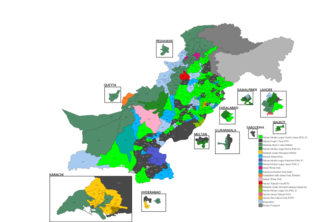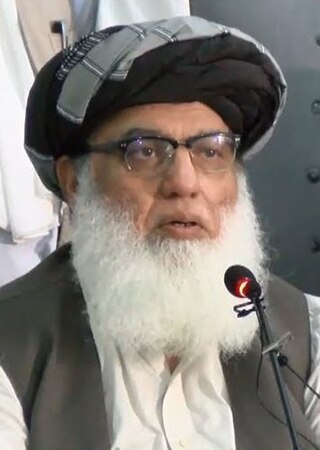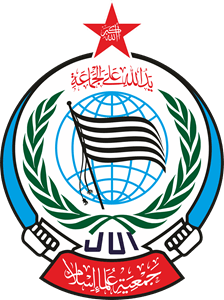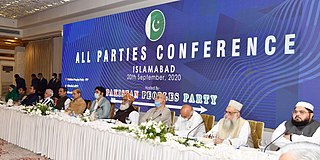
Makhdoom Muhammad Javed Hashmi, is a Pakistani politician, political realist, and a senior conservative thinker on the platform of Pakistan Muslim League (N).

Jamiat Ulema-e-Islam is a Deobandi Sunni Muslim organization that was founded on 26 October 1945 by Shabbir Ahmad Usmani as a pro-Pakistan offshoot of the Jamiat Ulema-e-Hind (JUH). It has run candidates for office in Pakistani provincial and national elections, and splintered into several groups in 1980, 2007, and 2020.

Mufti Mehmood was a Pakistani statesman and Islamic scholar who was one of the founding members of the Jamiat Ulema-e-Islam (JUI); widely regarded as one of the greatest politicians in the history of Pakistan - known for his political acumen. He served as the first elected Chief Minister of Khyber Pakhtunkhwa, and later on as the Leader of the Opposition in National Assembly. He led the opposition movement Pakistan National Alliance against Zulfiqar Ali Bhutto, which eventually led to Bhutto's downfall. He was among the principal architects of the 1973 Constitution of Pakistan.

Fazal-ur-Rehman is a Pakistani politician who is the president of Jamiat Ulema-e-Islam (F). He is also the president of the Pakistan Democratic Movement (PDM), a coalition of political parties which ousted then prime minister Imran Khan through a no-confidence motion in 2022. He has been a member of the National Assembly since February 2024 and previously served in that position between 1988 and 2018. He was also the Leader of the Opposition from 2004 to 2007. He is a supporter of the Taliban government in Afghanistan and has demanded for its international recognition. In the 1980s, he was part of the Movement for the Restoration of Democracy (MRD), which was formed to end the military regime of General Zia-ul-Haq.

General elections were held in Pakistan on 10 October 2002 to elect the 12th National Assembly and four Provincial Assemblies. The elections were held under the military government of Pervez Musharraf. The two mainstream parties, Pakistan Peoples Party (PPP) and Pakistan Muslim League (N) (PML-N) had several restrictions imposed on them and their leaders Benazir Bhutto and Nawaz Sharif were in exile. In order to address the restrictions, PPP created the Pakistan Peoples Party Parliamentarians (PPPP) under the leadership of Ameen Faheem, to contest the elections on its behalf. The PML-N meanwhile, suffering from the party's division into two factions: one that remained loyal to Sharif and were contesting the elections under the leadership of Javed Hashmi, and the other which had broken away to form the pro-Musharraf Pakistan Muslim League (Q) (PML-Q) under the leadership of Mian Muhammad Azhar. The emergence of the PML-Q marked the beginning of multi-party politics in the country, bringing an end to the decade-long two-party system between the PPP and PML-N.

Jamiat Ulema-e-Islam Pakistan also known the Jamiat Ulema-e-Islam or simply as Jamiat Ulema-e-Islam (F)(Urdu: جمیعت علماءِ اسلام (ف); lit. 'Assembly of Islamic Clerics (Fazal-ur-Rehman)'; abbr.JUI (F) is an Islamic fundamentalist political party in Pakistan. Established as the Jamiat Ulema-e-Islam in 1945, it is the result of a factional split in 1988, F standing for the name of its leader, Fazal-ur-Rehman.

Atta-Ur-Rehman, born 25 July 1965) is a Pakistani politician currently serving as Senator.
Fazal ur Rehman Khalil is a founder of Harkat-ul-Mujahideen and current leader of Ansar-ul-Umma, which is accused of being a front organization of the banned HuM. He also runs the Jamia Khalid Bin Walid, a madrasa or Islamic seminary located in the Shams Colony of Islamabad’s Golra town which has been accused of supporting the Tehrik-i-Taliban Pakistan. He is considered to be close to the Talibans and former Pakistan Prime Minister Imran Khan.
The 2014 Tsunami March, also called the Azadi movement, was a protest march in Pakistan from 14 August to 17 December 2014. The march was organized by the Pakistan Tehreek-e-Insaf (PTI) and Pakistan Awami Tehreek (PAT) against the Pakistani government of Nawaz Sharif. PTI claimed systematic election-rigging in the 2013 general election, and PAT demanded justice for the culprits in the 2014 Lahore clash. Then PTI chairman Imran Khan had announced plans for an August march from Lahore to Islamabad with a group of protesters in a PTI jalsa (demonstration) in Bahawalpur on 27 June 2014. On 17 December, a day after the 2014 Peshawar school massacre, Khan called off the protest.
Dawar Khan Kundi is a Pakistani politician who is a member of the National Assembly of Pakistan since February 2024. He was also a member from September 2013 to May 2018.

Maulana Muhammad Khan Sherani is a Pakistani Deobandi religious cleric and politician who established Rabita Jamiat Ulema-e-Islam the breakway faction of Jamiat Ulema-e-Islam (F) over rifts with (JUI-F) leader Fazal-ur-Rehman. He had been a member of the National Assembly of Pakistan, between 1988 and May 2018. He was the Chairman of the influential Council of Islamic Ideology from 2010 to 2016.

Presidential elections were held in Pakistan on 4 September 2018. The elections saw Arif Alvi of PTI being elected as the 13th president of Pakistan after defeating Fazal-ur-Rehman of MMA and Aitzaz Ahsan of PPP. Although incumbent president Mamnoon Hussain, whose term was to expire on 9 September 2018, was eligible for re-election, he declined to take part.
On 12 May 2017, a suicide bombing targeted the convoy of the Deputy Chairman of the Senate of Pakistan, Abdul Ghafoor Haideri, a JUI (F) member, on the N-25 National Highway in Mastung District, Balochistan, Pakistan. At least 28 people were killed; 40 others were injured, including the Senator. The Islamic State of Iraq and the Levant claimed responsibility for the attack. The attack was an unsuccessful attempt to assassinate Haideri.

Jamiat Ulema-e-Islam Pakistan (S) commonly known as Jamiat Ulema-e-Islam (S) is a political party in Pakistan. It was established in 1980, as a breakaway faction of Jamiat Ulema-e-Islam (JUI) founded by Maulana Shabbir Ahmed Usmani in 1945. The "S" in its name stands for the name of its leader, Maulana Sami-ul-Haq. A small party in the realm of Pakistani politics it achieved some success in 2002 when it joined the provincial government in Khyber Pakhtunkhwa as a junior member of the Muttahida Majlis-e-Amal (MMA) coalition government.

Rabita Jamiat Ulema-e-Islam (RJUI) is a Deobandi Islamist political party in Pakistan. It was established on 29 December 2020 as a breakway faction of Jamiat Ulema-e-Islam (F) (JUI-F), which was led by Fazl-ur-Rehman. The founder of the RJUI is Muhammad Khan Sherani and the Ameer of the party is Shuja ul Mulk. The party was registered with the Election Commission of Pakistan on 20 September 2022.

General elections, originally scheduled to be held in 2023, were held in Pakistan on 8 February 2024 to elect the members of the 16th National Assembly. The Election Commission of Pakistan announced the detailed schedule on 15 December 2023.

The Pakistan Democratic Movement was a coalition of political parties in Pakistan. It was founded in September 2020 as a opposition movement against Imran Khan, accusing his administration of poor governance, political victimization of opponents, and mismanaging the economy and foreign policy. Khan rebuked these allegations, during and after his tenure as Prime Minister
In April 2022, a no-confidence motion against Imran Khan led to his removal as the prime minister of Pakistan. Based largely on the Westminster system of legislature, the prime minister commands confidence of the majority of the lower house of Parliament, the National Assembly of Pakistan, under clause (2A) of Article 91 of the Constitution. Numerous opposition parties joined forces to file the motion of no confidence against Imran Khan in the National Assembly. It ultimately led to the removal of Khan from office as a majority passed the motion in the Lower House.

By-elections were held on 8 National Assembly and 3 Punjab Assembly constituencies in Pakistan on 16 October 2022 and 1 National Assembly seat on 30 October 2022. Pakistan Tehreek-e-Insaf got a landslide victory by winning 7 out of 9 National Assembly and 2 out of 3 Punjab Assembly seats whereas the Pakistan Democratic Movement, an alliance of 14 parties, was only able to win 2 National Assembly seats and 1 Punjab Assembly seat.
On 3 November 2022, Imran Khan, a former prime minister of Pakistan and chairman of the Pakistan Tehreek-e-Insaf (PTI) political party, was shot in an attempted assassination in Wazirabad, Punjab, during the 2022 Azadi March II against the Pakistan government. The gunman also injured a number of other PTI leaders and killed a supporter. The attacker's name is Muhammad Naveed and another unidentified gunman was killed.















